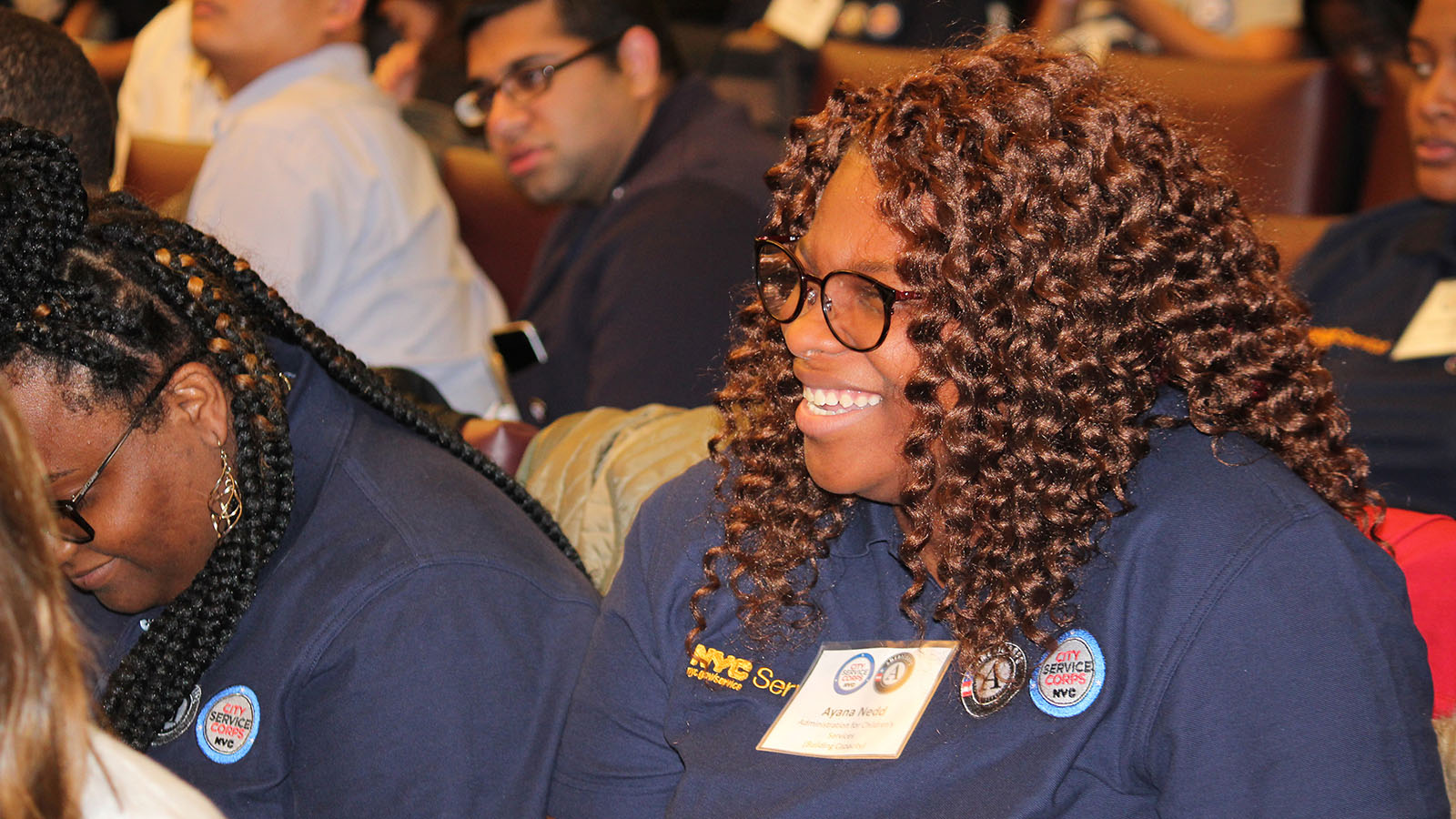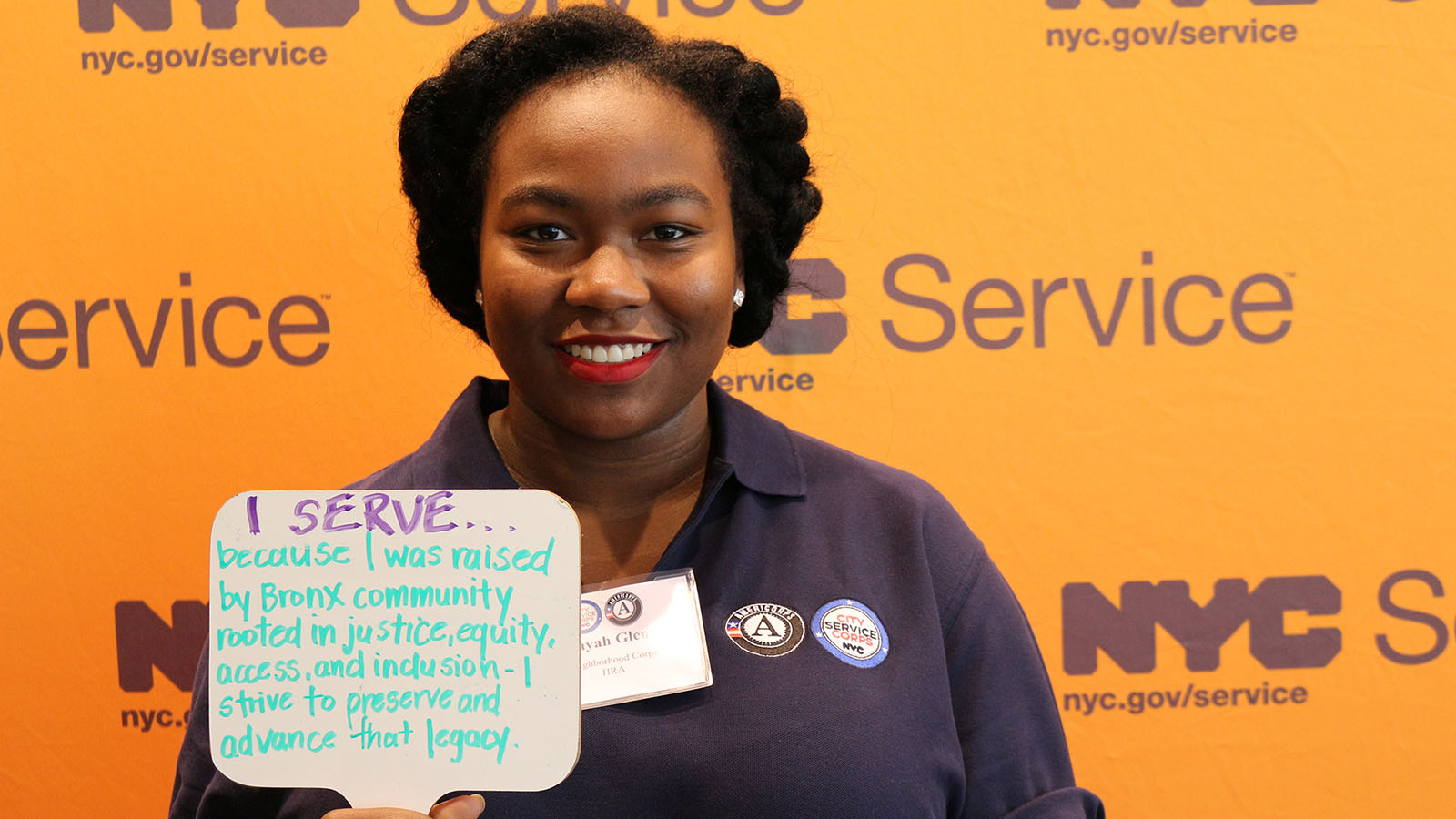Implementation
Implement Your Program
How you operate your AmeriCorps program depends on your design. You may be supervising members directly at your organization/agency, or – as in NYC Service’s case – you may be administering a program with members assigned to external supervisors and host sites.
Since NYC Service holds the AmeriCorps contract for City Service Corps, the office serves as the central program administrator. NYC Service oversees finance, compliance and human resources functions for the program. However, members do not report to NYC Service on a day-to-day basis; they report to agency host sites.
Systems
NYC Service has implemented several systems to ensure the successful operation of the City Service Corps model.
NYC Service tracks City Service Corps members’ hours on a weekly basis, through the online tracking tool America Learns. Each City Service Corps member has their own login and records the hours they served during the week. Host site supervisors and NYC Service staff must approve the timesheets. Creating an easy-to-use timekeeping system is a critical part of running an AmeriCorps supported program, as program staff must be able to demonstrate members have completed a minimum number of hours to receive their Education Award.
NYC Service, as a division of the Mayor’s Office, does not have the ability to pay AmeriCorps members serving at other City agencies. In addition, City Service Corps members are federally prohibited from being considered City employees and cannot be placed on New York City’s payroll. Therefore, NYC Service sets up and administers payroll for each member through the payroll vendor Community Software Solutions (CSS) . At the beginning of each service term, NYC Service staff enters the information of each member into the system. Then, every other week, staff must input City Service Corps member service days, so those members can be paid by direct deposit or payroll card. Using a payroll vendor allows NYC Service to centralize the payment of members and remove that administrative burden from host sites.
Members who need health insurance coverage receive it at no additional cost to them, as part of the City Service Corps program. They currently receive coverage through Cigna health insurance via The Corps Network, a national program that provides this option for many AmeriCorps programs across the country. Members can opt in and out of coverage at any point during the program. NYC Service is responsible for enrolling interested members, and ensuring the monthly payment of the health insurance premiums for all enrolled. AmeriCorps supported programs working with full-time members (those serving 1200 or 1700 hours) are required to offer Minimum Essential coverage to members who are in need of health care coverage.
Compliance
NYC Service is responsible for ensuring that City Service Corps members and supervisors know, understand, and follow specific rules and regulations governing an AmeriCorps supported program. These rules and regulations, known as “Allowable, Prohibited and Unallowable Member Activities,” cover a range of activities, from lobbying on behalf of legislation to conducting voter registration; from engaging in religious instruction to benefitting for-profit businesses. NYC Service reviews these rules and regulations numerous times throughout the year – at members’ orientation and monthly trainings, and at supervisors’ orientation and quarterly meetings.

NYC Service must complete a National Service Criminal History Check (NSCHC) for each City Service Corps Member before they can gain service hours, as this is a requirement based on federal law that oversees AmeriCorps programming. If it is not properly conducted, programs could face fines and are at risk of being shut down. AmeriCorps supported programs are required to certify these background checks have been completed 19 City Service Corps Blueprint Nyc.gov/service before the member’s start date on the AmeriCorps website in order for a member to gain any service hours or be officially enrolled in the program. Some host sites require additional background check documents or checks before a member can begin. NYC Service works with the accepted member and the host site to ensure that these are complete before the member begins their service.
NYC Service staff also conduct three site visits with each member and supervisor during the program year to ensure compliance with all AmeriCorps and NYC Service rules, verify the accuracy of the reported performance data, as well as coach members and supervisors on any challenges they may be facing during the program year.
Documentation
As an AmeriCorps supported program, CNCS requires NYC Service maintain documentation on each of its members. This includes the member’s program application, identification documents, background check authorization and results, evaluations, and exit documentation.
NYC Service has worked with the City government’s technology and cybersecurity professionals to create an encrypted, secure server to store all member information. Additionally, NYC Service started contracting with Box.com to securely collect member documentation that includes personal identifying information. Members must present their documentation for staff to review and certify at a member pre-orientation.
Day-to-Day Supervision
While NYC Service is responsible for program administration, the host sites are responsible for the day- to-day supervision of City Service Corps members. This requires close partnership and regular communication with host sites to ensure that everyone understands the roles of City Service Corps members and the responsibilities of supervisors to follow NYC Service policies as well as AmeriCorps federal rules and regulations.
City Service Corps members, while not employees of the host sites, must follow the rules of their host sites, which are reviewed at an on-site orientation that is required for all host sites to provide for their member. This also requires regular communication and contact between host site supervisors and NYC Service.
City Service Corps members must have access to and be trained on the relevant systems and programs at their host sites and host site supervisors are required to have weekly check-ins with members. These expectations are clearly laid out in a Memorandum of Understanding (MOU) with the host site, in the host site supervisor handbook, and during supervisor orientation before members begin their service.

I have had the pleasure of completing two years of service with NYC Service. Both terms I served with the Department of Health and Mental Hygiene at the Brownsville Health Action Center. I had an amazing supervisor who supported me the whole way through and even now. Over these two years I have been given plenty of space to be creative.
- Keira Sutton, City Service Corps Member 2017-2018
Operate an AmeriCorps Program Efficiently
NYC Service administers four AmeriCorps supported programs: City Service Corps, NYC Civic Corps, NYC VISTA, and Peer Corps. The NYC Service staff operating these programs includes one managing director, two managers, and five coordinators, who are responsible for managing professional development, administrative functions, host site visits, member concerns, funder reports, and more.
Whether you are operating multiple AmeriCorps programs within your office or plan events with other AmeriCorps programs in your city, finding efficiencies and sharing resources can be helpful.
1. Share resources.
From orientation materials to site visit checklists, many of the resources created for one AmeriCorps program could be useful for another AmeriCorps program. In fact, City Service Corps is making many of its resources available as part of this Blueprint
2. Create bigger events for members.
The Corporation for National and Community Service (CNCS) requires certain events to be held each year – orientation and an AmeriCorps kickoff, for example. Combining these events with other programs provides an opportunity to make these events bigger – because of both larger budgets and more people involved – and have a stronger impact on members.
3. Communicate across programs.
It is important to have specific staff members as the contacts for a particular program, to provide consistent contact and support for members throughout their program year. However, program staff members can also solve common problems and develop common systems if they are working cross-program with other staff members. NYC Service has staff committees focused on training and compliance to keep the focus on improving these important areas of our AmeriCorps programs.
4. Create a stronger network.
Operating four AmeriCorps programs at NYC Service allows for a larger pool of members to share experiences and create lasting connections with each other. NYC Service provides volunteering events for members, and we also provide informal events, such as board game nights, which allow them to get to know each other outside of their official roles.
Managing Director, Service Year Programs
Mind the details
In its first year, NYC Service staff hit several hurdles in setting up workers’ compensation and disability insurance, which is required for AmeriCorps members. These hurdles were unique to AmeriCorps programs that operate in the municipal government setting.
The statute governing AmeriCorps specifies that members are not employees. For this reason, New York City government could not consider them employees, and thus could not cover them. NYC Service spent a significant amount of time working to get proper workers’ compensation and disability insurance – and eventually did so by purchasing it through a private insurer.
There were also challenges in getting a system set up for payroll. Instead of building our own system, we first asked other agencies that pay individuals who are not employees of the City about their systems. Early on, we were connected with the agency that oversees the City’s Summer Youth Employment Program which engages - and pays - thousands of youth each summer. Their contract with the payroll vendor (CSS) was amended to include City Service Corps and a new interface was built for our program needs. That interface includes a program side where NYC Service staff enter payroll details each week as well as a member-facing side where members can download paystubs and tax documents. Because NYC Service doesn’t own the contract, we need to work with the contracting agency each year to ensure that we are included. The set up also requires that each agency’s funding for the members be routed through the contract-holding agency who send the payroll amount to the vendor each payroll period. We are fortunate that the system has been very user-friendly and provided a very reliable means by which to distribute the member stipend.
While NYC Service is required to do a background check for each member before they can begin service, partner agencies may have additional background checks or other administrative paperwork that needs to be completed before the member can begin. Accepted agencies need to alert NYC Service to their process after being accepted as a host site. The agency is then expected to reach out to the member once they have accepted their offer so any agency processes do not delay the member start date.
Start early, think through all human resources needs and requirements, develop partnerships with key agency staff in the budget and administrative offices, and plan ahead.

